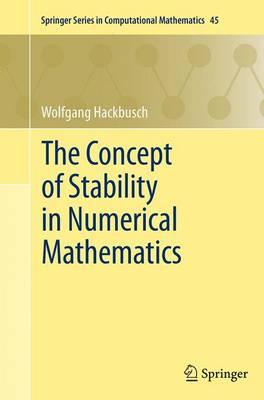Full Product Details
Author: Wolfgang Hackbusch
Publisher: Springer-Verlag Berlin and Heidelberg GmbH & Co. KG
Imprint: Springer-Verlag Berlin and Heidelberg GmbH & Co. K
Edition: Softcover reprint of the original 1st ed. 2014
Volume: 45
Dimensions:
Width: 15.50cm
, Height: 1.10cm
, Length: 23.50cm
Weight: 3.168kg
ISBN: 9783662513712
ISBN 10: 3662513714
Pages: 188
Publication Date: 23 August 2016
Audience:
Professional and scholarly
,
Professional & Vocational
Format: Paperback
Publisher's Status: Active
Availability: Manufactured on demand

We will order this item for you from a manufactured on demand supplier.
Reviews
The contents are presented in a way that is accessible to graduate students who may use the book for self-study of the topic, and it can easily be used as a textbook for a corresponding lecture series. Moreover, advanced researchers in numerical mathematics are likely to benefit from reading it, in particular because the book provides interesting insight into how stability relates to areas other than their own particular specialization field. ... also useful reading material for numerical software developers. (Kai Diethelm, Computing Reviews, October, 2015) This book is concerned with stability properties in various areas of numerical mathematics, and their strong connection with convergence of numerical algorithms. As a side effect, any parts of numerical analysis are reviewed in the course of the stability discussions. The book aims in particular at master and Ph.D. students. (M. Plum, zbMATH 1321.65139, 2015) This nontraditional book by Hackbusch (Max Planck Institute for Mathematics in the Sciences, Germany) headlines the abstract stability concept. ... ultimately serves a broad but unusually thoughtful introduction to (or reexamination of) numerical analysis. Summing Up: Recommended. Upper-division undergraduates and above. (D. V. Feldman, Choice, Vol. 52 (4), December, 2014) It is the perfect complement to a lecture series on numerical analysis, starting with stability of finite arithmetic, quadrature and interpolation, followed by ODE, time-dependent PDE, Elliptic PDE, and integral equations. ... All chapters are presented self-contained with separate reference list, so that they can be studied independently. ... it is highly recommended for all lectures and all students in applied and numerical mathematics. (Christian Wieners, Zeitschrift fur Angewandte Mathematik und Mechanik, Vol. 94 (9), 2014)
“The contents are presented in a way that is accessible to graduate students who may use the book for self-study of the topic, and it can easily be used as a textbook for a corresponding lecture series. Moreover, advanced researchers in numerical mathematics are likely to benefit from reading it, in particular because the book provides interesting insight into how stability relates to areas other than their own particular specialization field. … also useful reading material for numerical software developers.” (Kai Diethelm, Computing Reviews, October, 2015) “This book is concerned with stability properties in various areas of numerical mathematics, and their strong connection with convergence of numerical algorithms. As a side effect, any parts of numerical analysis are reviewed in the course of the stability discussions. The book aims in particular at master and Ph.D. students.” (M. Plum, zbMATH 1321.65139, 2015) “This nontraditional book by Hackbusch (Max Planck Institute for Mathematics in the Sciences, Germany) headlines the abstract stability concept. … ultimately serves a broad but unusually thoughtful introduction to (or reexamination of) numerical analysis. Summing Up: Recommended. Upper-division undergraduates and above.” (D. V. Feldman, Choice, Vol. 52 (4), December, 2014) “It is the perfect complement to a lecture series on numerical analysis, starting with stability of finite arithmetic, quadrature and interpolation, followed by ODE, time-dependent PDE, Elliptic PDE, and integral equations. … All chapters are presented self-contained with separate reference list, so that they can be studied independently. … it is highly recommended for all lectures and all students in applied and numerical mathematics.” (Christian Wieners, Zeitschrift für Angewandte Mathematik und Mechanik, Vol. 94 (9), 2014)
The contents are presented in a way that is accessible to graduate students who may use the book for self-study of the topic, and it can easily be used as a textbook for a corresponding lecture series. Moreover, advanced researchers in numerical mathematics are likely to benefit from reading it, in particular because the book provides interesting insight into how stability relates to areas other than their own particular specialization field. ... also useful reading material for numerical software developers. (Kai Diethelm, Computing Reviews, October, 2015) This book is concerned with stability properties in various areas of numerical mathematics, and their strong connection with convergence of numerical algorithms. As a side effect, any parts of numerical analysis are reviewed in the course of the stability discussions. The book aims in particular at master and Ph.D. students. (M. Plum, zbMATH 1321.65139, 2015) This nontraditional book by Hackbusch (Max Planck Institute for Mathematics in the Sciences, Germany) headlines the abstract stability concept. ... ultimately serves a broad but unusually thoughtful introduction to (or reexamination of) numerical analysis. Summing Up: Recommended. Upper-division undergraduates and above. (D. V. Feldman, Choice, Vol. 52 (4), December, 2014) It is the perfect complement to a lecture series on numerical analysis, starting with stability of finite arithmetic, quadrature and interpolation, followed by ODE, time-dependent PDE, Elliptic PDE, and integral equations. ... All chapters are presented self-contained with separate reference list, so that they can be studied independently. ... it is highly recommended for all lectures and all students in applied and numerical mathematics. (Christian Wieners, Zeitschrift fur Angewandte Mathematik und Mechanik, Vol. 94 (9), 2014)
Author Information
The author is a very well-known author of Springer, working in the field of numerical mathematics for partial differential equations and integral equations. He has published numerous books in the SSCM series, e.g., about the multi-grid method, about the numerical analysis of elliptic pdes, about iterative solution of large systems of equation, and a book in German about the technique of hierarchical matrices. Hackbusch is also in the editorial board of Springer's book series ""Advances in Numerical Mathematics"" and ""The International Cryogenics Monograph Series"".




